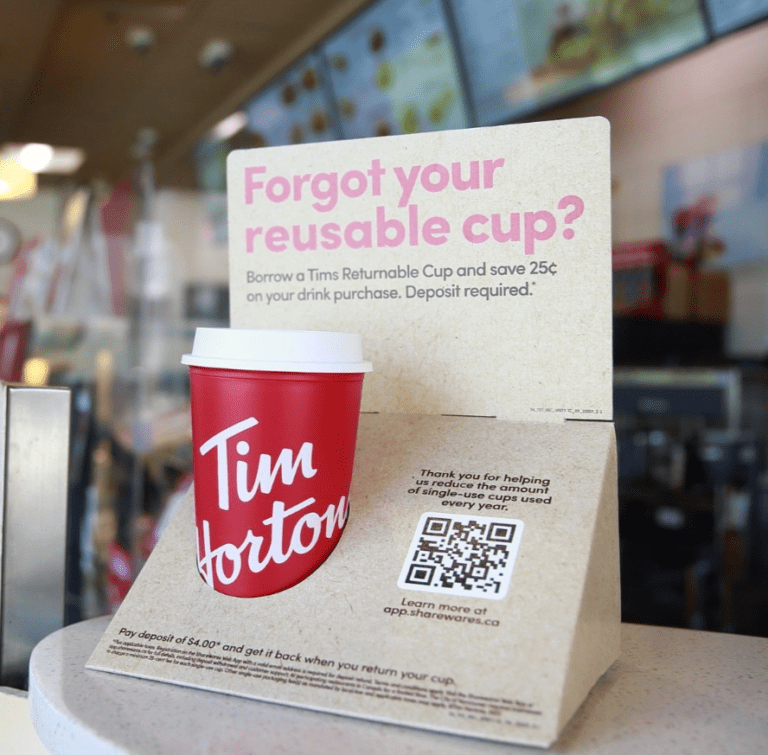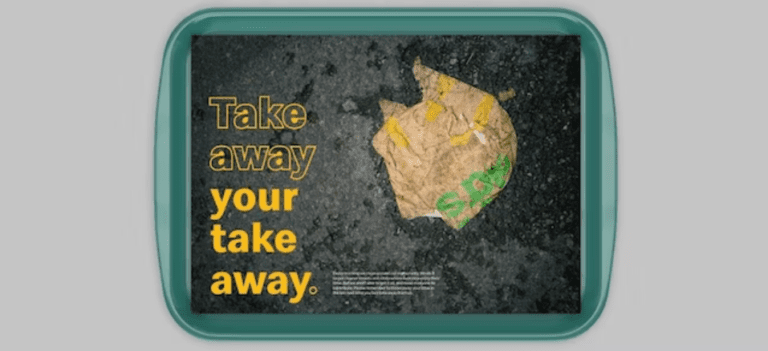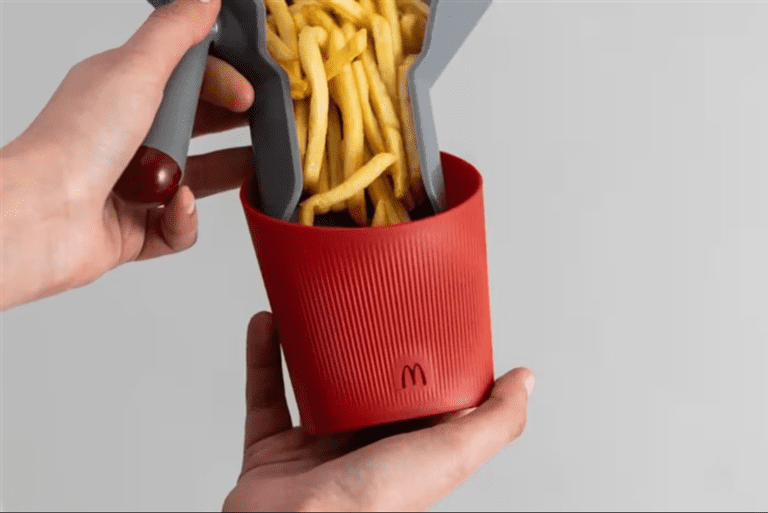

Michelle Brake
When we think about how change can happen at the global level to reduce single-use waste, we know that large, multinational corporations play an integral role. Some of the restaurants that are built into our everyday routines as Canadians have to get on board to be a part of this change.

Sharewares’ reuse model for Tim Horton’s locations.
If we list some of these restaurants– Tim Horton’s, A&W, and McDonald’s, their names evoke memories and an association with convenience. Despite the amount of waste fast food businesses generates each year, very seldom is our first thought about their waste problems.
Thankfully, there are businesses on this list willing to take on the responsibility of reducing their single-use footprint by participating in reduction initiatives and trialling pilots for reusable solutions. For example, if you walk into a Tim Horton’s store in Vancouver, you’ll be happy to find Sharewares’ reusable cups available as a waste-free option for your double-double.
However, not all of our favourite fast food restaurants have been so willing to take action. In fact, some are directly opposed to the solutions we desperately need to avoid sinking deeper into a plastic pollution crisis. We’ve been particularly disappointed in some of the steps McDonald’s has taken recently to prevent and stall the implementation of reusable packaging.
In the EU, where the progressive new Packaging and Packaging Waste regulations intend to usher in a new era of reusable packaging, McDonald’s is rolling out an extensive lobbying campaign defending their use of wasteful disposable food packaging. They’ve gone so far as to support a franchisee suing the German city of Tübingen, which adopted a policy to tax local businesses up to 1.50 euros for the disposable packaging associated with a meal and was set to begin in January 2022. The legal battle continued into May 2023 when it reached Germany’s Federal Administrative Court. The Court decided in favour of Tübingen, supporting the City’s ability to tax companies based on the true environmental cost of single-use fast food packaging they distribute.
Part of McDonald’s lobby against reusable packaging infrastructure has also included joining together similarly-minded industry groups to launch anti-reuse websites, sponsoring news articles in large publications that attack the EU’s legislation on the grounds it would undermine Europe’s net zero carbon targets, and producing several reports that present the same case.
A recent report that McDonald’s sponsored, “No Silver Bullet,” is gaining traction in many circles discussing what the next steps for packaging should be. The case put forward by McDonald’s and the reporting consulting agency, Kearney, concerning reusables is largely based on cherry-picked arguments that lack peer-reviewed data and transparency. There are three primary reasons why this report does not accurately represent the potential of reusable packaging, and its validity should be questioned:
1) The bias of being commissioned and co-sponsored by McDonald’s, one of the largest generators of single-use packaging in the world.
It’s estimated that McDonald’s produces approximately three tonnes of packaging waste every minute, which equals almost two million tonnes of packaging waste every year. They have a vested interest in keeping business as usual because they’ve implemented a system of acquiring and distributing disposable packaging cheaply. This process doesn’t price out the environmental cost of millions of tonnes of single-use packaging ending up in landfills and our environment every year. Companies like McDonald’s benefit from the current model of take-make-waste because it’s seemingly inexpensive and fast. Adopting more meaningful circular packaging solutions requires time and innovation. This means that it’s easier for such companies to assign funding and public campaign efforts to lobby against change than it is to reconcile with the fact that the system they’ve built needs to change.
2) The lack of references, peer-reviewed data, and empirical evidence throughout the report to support what they claim to be a “fact-based” argument against reusable packaging.
The report insists that the case presented against reusable packaging is fact-based. However, there is no evidence provided in the report to support these claims. It’s extremely problematic that there are no specific references to external, credible data and there is a glaring absence of a bibliography. The methodology of the report is also vague, as the report doesn’t clarify the assumptions that are made to achieve the conclusions and recommendations. The report mentions that the findings are based on publicly available data, insight from industry, and proprietary data. If the data is publicly available, the report fails to cite these sources so the reader can confirm the report’s suggestions independently. Although this piece is presented as an academic report, we would suggest that with the lack of stated supporting evidence, this report is less fact-based, and more opinion-based to fit McDonald’s lobbying narrative.
3) The solution presented in the report is entirely dependent on improving the recycling system.
Recycling has been the norm for decades, and yet we’ve seen no progress in its ability to successfully capture single-use packaging. In Surfers Against Sewage’s most recent litter audit in the UK, they found McDonald’s was the second worst polluter, responsible for 11% of the total litter collected during the cleanup. It is irresponsible and inaccurate for McDonald’s to suggest that investing in improving the recycling system is the optimal solution. This type of action is in opposition to their public target of reducing the amount of material used across packaging by 20% by 2030. They’ve even acknowledged that they have a packaging pollution problem with public campaigns while placing the onus on the public to prevent litter instead of tackling their problem at the source. This is a way for packaging companies to lobby for the continuation of a system that makes record profits by producing cheap materials without paying for the environmental consequences.


Advertisement for McDonald’s litter campaign in Norway assigning customers the responsibility for packaging waste.
When we think of fast food service, we often think of convenience, but do we want that convenience to come at the cost of millions of tonnes of disposable packaging waste? As food service companies join in the mission to improve the availability, accessibility, and affordability of reusable packaging, we can make reusables the most convenient option for everyone. Increased participation from food service companies in a reusable system also results in more effective transportation and cleaning logistics as well, generating sustainable outcomes across the entire life cycle of packaging.


McDonald’s reusable packaging for on-site dining in France. This model could be replicated for their packaging all over the world.
We’re all searching for the right solution to reduce our impact on the environment and create less waste. Although admittedly there is no silver bullet solution for our packaging problem, large corporations can’t act misleadingly to avoid investing in the change we so urgently need to adopt. Instead of avoiding taking responsibility for the problem they’ve created, McDonald’s and other food service companies must start actively implementing reusable systems and eliminating their disposable packaging portfolios. Without a significant shift in corporate values and an honest pricing of disposable materials based on their true environmental cost, we’ll continue to suffer the consequences of single-use pollution and material overconsumption.
What are your thoughts on companies avoiding responsibility for the waste they generate? Do you know any businesses in the food service sector looking to make the transition away from single-use packaging? Check out our Plastic Awareness and Reduction Toolkits for food service here!
